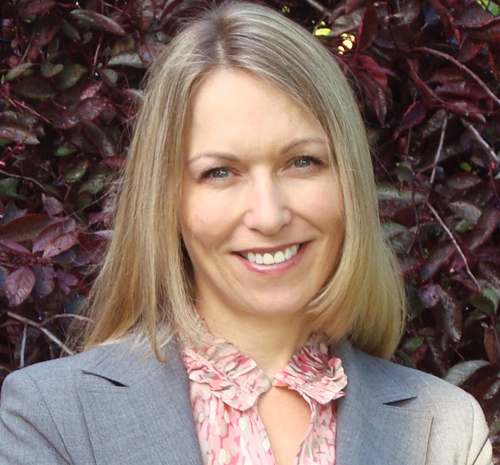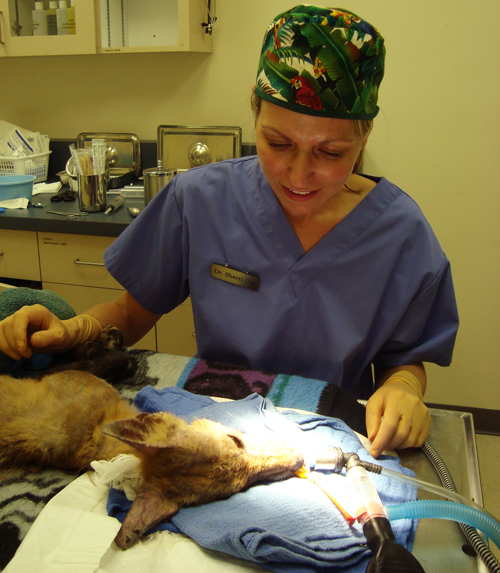
It’s a tragic memory Prof. Sherri Cox can’t forget. “I was volunteering in Spain, helping with the oiled wildlife response, mainly of seabirds caught in an oil spill. We could see a gannet shivering with cold, and we couldn’t get to him. It was terrible to see him suffering and not be able to help.”
She suspects the bird eventually died and says that’s the fate of most birds that encounter oil spills at sea. “It is documented that a drop of oil the size of a quarter is enough to kill a seabird,” says Cox, associate dean, administration, and chief operating officer of the Ontario Veterinary College Health Sciences Centre.
She explains that oil changes the feather composition so affected birds are no longer waterproofed and aren’t insulated against the cold water. Birds also preen themselves to try to remove the oil and end up ingesting the toxic substance.
But often these birds and other animals harmed by the oil can be helped. While many never make it to shore, those that are found may be able to be stabilized, rehydrated, fed and carefully washed to remove all the oil.
Caring for these birds and other oiled animals has been a passion for Cox, who is a wildlife veterinarian. Over the past 12 years, she has helped with the 2002 Prestige spill off the coast of Spain and worked in South Africa, where African penguins are continuously affected by oil and face other threats to their survival.
“A century ago, there were more than two million African penguins; now there are only 25,000 breeding pairs left,” says Cox. The International Union for Conservation of Nature recently upgraded the African Penguin to an endangered species.
There’s a little bit of mystery about these penguins: while many are found coated with oil, no accident or known incident has taken place to cause oil to flow into the ocean. “We speculated that many penguins were oiled from bilge oil, often intentionally dumped by ships,” Cox says.
To test this, she arranged with Venessa Strauss from the South African Foundation for the Conservation of Coastal Birds to send 171 samples of oil-from coated feathers to Environment Canada laboratories in Moncton, N.B. The lab was able to “fingerprint” the oil and determined that most were a mixture of oils consistent with bilge oil. That suggests that the bilge oil hypothesis is likely correct for many of these birds.
While the role of volunteers in helping these animals can’t be overstated, Cox also sees the necessity for governments, NGOs, and local communities to come together to be prepared to respond to wildlife affected by oil spills. She recently travelled with Strauss to Tanzania to meet with local government and NGO representatives to discuss preparation in the event of an oil incident. There is off-shore drilling in Tanzania, but Cox says that’s not the only risk. “Every day, they take enough trash to fill up an entire room from one small beach where endangered sea turtles have their nesting sites. We watched three turtles come out of their nest and fight through trash to make it to the ocean. Some of the garbage thrown into the water in the Indian Ocean washes up on Tanzania’s coast. That means any oil spills out in that part of the ocean may wind up there, too.”
Cox would like to do more of this kind of work in Canada. As she points out: “Canada has the longest coastline in the world.” She would like to see professional standards of care for veterinarians and staff for the assessment, treatment and rehabilitation of oiled sea life in Canada. Much of the information Cox uses in her policy discussions has been created by Sea Alarm, an NGO in Belgium that helps organizations and government prepare for an oiled wildlife response.
Closer to home, Cox also helps out about one day a week with the Toronto Wildlife Centre. “Many people don’t realize that Canadian animals are endangered as well. Seven out of the eight species of turtles in Ontario, for example, are on the list as threatened or of special concern. Saving just one snapping turtle could impact the entire population because snapping turtles have to survive for about 20 years before being able to reproduce,” she says.

Not all veterinarians treat wildlife, and she admits it can be challenging to diagnose and treat these animals. “There is so much variety,” she says. “On a typical day, I might see a raccoon, a peregrine falcon, a kestrel, a snake and some songbirds. If someone brings in an injured fox, you probably don’t have much history and no owner to say ‘he’s been vomiting for three days’ or ‘he’s not eating like he usually does,’ so you have to do a lot of investigative work to figure out what is wrong.” But it’s also very rewarding: she performed abdominal surgery on a Great Horned Owl recently and was delighted to see him make a full recovery and be released back into the wild.
Cox also emphasizes education; she speaks to various groups and to the individuals who bring in the animals they have found. Her approach is to work with people to come up with solutions that are relevant and applicable to the needs of local communities, government and the culture of a particular country.
Despite the demands of her full-time job at U of G, Cox is passionate about her volunteer work. “I am interested in the policy side of how we approach wildlife issues as well as the veterinary medicine side. We have an opportunity to work at the intersection of humans, animals and the environment through helping individual animals, populations and ecosytstem health. ”
As much as the image of the oil-coated gannet dying off the coast of Spain still haunts her, she says there is another that inspires her – the fully healed and cleaned penguins returned to the ocean off South Africa, swimming exuberantly around the boat as they realized they were once again home.